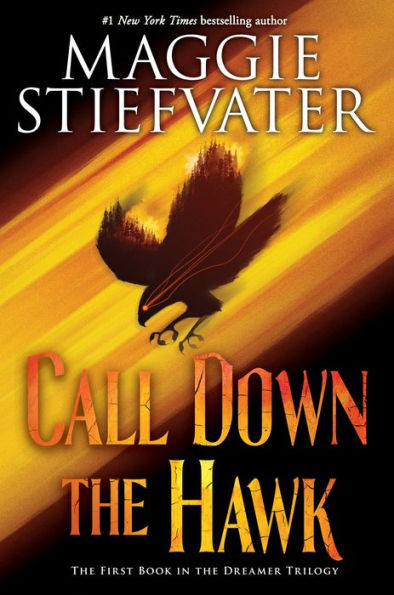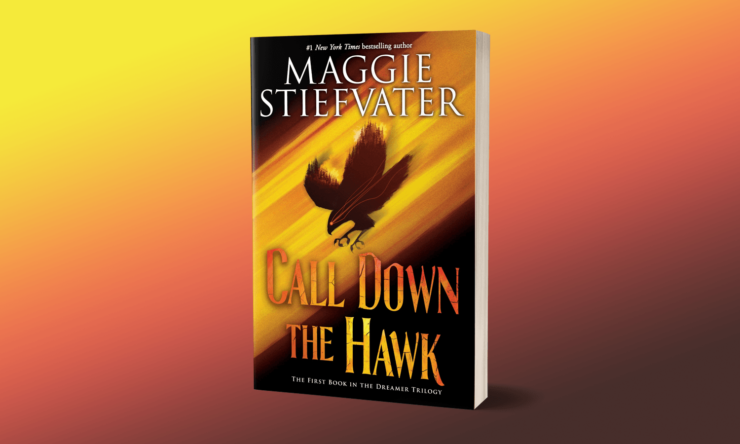Call Down the Hawk is the first of the Dreamer Trilogy, a spin-off series from Stiefvater’s critically acclaimed Raven Cycle quartet. Ronan Lynch, the dreamer, returns as one of our protagonists; the other two significant narrators are a thief, Jordan Hennessy, and a hunter, Carmen Farooq-Lane. All three are driven by separate motivations, but the approaching end of the world—and a terrible nightmare that looms large in the dreamers’ worlds, plus the appearance of a dangerous deterioration of their bodies that comes if they pause dreaming—will shove them onto a collision course with each other.
Sins of the father and lies from the past pull Ronan and his brothers into a world of black market art and services, into the underbelly that Declan fought to keep Ronan free of for so long. Hennessy is searching for the solution to a dreaming problem using her own forgeries as an in-road on her quest. And Farooq-Lane, she’s hunting for dreamers themselves and their dreamed creatures, for unpleasant and deadly reasons.
Call Down the Hawk is a good novel—well paced, rich with Stiefvater’s lyrical and revealing prose, and dense with characters whose competing desires put them into major conflict—though it’s lacking a bit of the drive that first books in a series often have. The arc of the book is predominantly stage-setting for a larger narrative, so while there is a climactic moment at the end, that climactic moment is more about people ending up in the same place than a thematic or narrative resolution. That’s fine, of course! It tells me that the trilogy will be more of the “one large book in separate containers” shape than “three separate books that build together” shape.
And while I more or less never feel compelled to talk about genre—for one, “genre” primarily functions in terms of marketing more than useful categorization—it does seem worth nodding to the fact that, though it’s still a young adult novel, Call Down the Hawk would be marketable as an adult book quite easily. ‘Crossover appeal,’ as they say in the business. Ronan is a young man stuck at the cusp of a future that is adult in scope and the book reflects that. For example, his boyfriend is off to college and he’s realized that he’s circumscribed by the dreaming, by the Barns, by a world he cannot merge into normal life. He’s not discovering love or discovering himself that already happened. Now he’s negotiating that self in the world.
It’s still got a coming of age vibe, but it’s the struggle of a freshly minted grown-up thinking about the future as a vista both gigantic and tiny, potential and restricted. Also, while the stakes of the Raven Cycle books are high (supernatural death and real death linger at the edges), the stakes of this trilogy are violent. Stiefvater has taken us across the barrier to a criminal underworld only hinted at previously. There’s a brutality, here, that the veil has been tugged off of, removing the soft focus of the prior books to give us a harder look at the world Declan (and Kavinsky) knew better than Ronan—who is, in some ways, a fresh-faced thing.
Spoilers follow.
Buy the Book


Call Down the Hawk
The government agency hunting and murdering dreamers, including little old ladies who make pottery, is hair-raising in its efficiency and soullessness. The Visionaries’ magic results in some gruesome on-screen deaths and mutilations, plus a good old helping of body horror. One of our protagonists, Jordan Hennessy, is an art thief and forger and murderer; another, Carmen Farooq-Lane, has become a killer herself in response to the horror of her dreamer brother’s murders (which, while not fully described, are utterly horrifying in the brief space given to them). Stiefvater’s hand at building animal fear, which popped up a few times at the spookiest moments in the Raven Cycle, has come to bear in this trilogy with gusto.
And that’s the part I found most compelling. The magic and glamour of the Raven Cycle quartet was broken up with dirt and realism on occasion—usually thank to Ronan, or Adam—but the Dreamer Trilogy is born from it, shading in the world outside of Henrietta. The question of “how on earth does no one realize who these dreamers are and take advantage?” had been asked in the prior books, and here we see that it isn’t the case that no one knows. There are more dreamers, and some are monsters, and some are prisoners of their dreaming, and some are small gods (like Ronan himself), and some people are in fact out to get them.
I had wondered, to be honest, what a return to the world of Ronan Lynch would look like: more of the same? The answer is that Call Down the Hawk strikes out on its own, both stylistically and in terms of the cast, rather than acting as a fifth book in an ongoing series. A reader unfamiliar with the Raven Cycle could begin here, and though some of the pleasure certainly relies on familiarity, Stiefvater has included enough brief summaries and hints to prior books that it’s readable regardless. In fact, the absence of his friends is one of the most mature and painful throughlines of the book for Ronan. As a person who doesn’t build casual relationships, who has space in his heart only for the people he’s made his family, Ronan is left flat-footed by that family all going off into the world in different directions having spent the prior year (or more, in Gansey’s case) on top of each other.
That’s, perhaps, a more adult narrative than all the government agencies and end-of-the-world trauma combined. He can’t hold them back but he also can’t follow them. There’s a moment, when he visits Adam at university, where the pair of them walk past each other without recognition, that punched me right in the gut—because Adam has changed, because the distance is palpable, because Ronan can’t fit in Adam’s new world, because it’s a disaster when he tries. Ronan learns an alternate color of depression as a man stuck but also displaced. It’s not the rage of his teenage misery, it’s just a quiet lack.
Hennessy and Farooq-Lane are also fascinating new protagonists: both adult women in their twenties, both damaged and damaging, both powerful in their own right but dragged into the mess of that damage at the same time. Farooq-Lane has a similar vibe as a narrator to the earliest appearances of Mr. Gray. She’s meticulous, regimented, particular, and motivated in equal parts by fear and survival, amoral. She thinks she’s saving the world but she’s finally starting to question the methodologies, having assisted in the murder of her brother but also several dreamers who didn’t “deserve it” as visibly. Watching her detachment dissolve is awful but electrifying, on a plot level.
Hennessy and her copies—Jordan, chief of all—present some echoes of the last dreamer Ronan had in his life, but also not at all the same. I found her response to trauma realistic and miserable: she cannot break loose of it enough to dream a different dream. I appreciate that Ronan’s help isn’t framed as “the white guy teacher” so much as “oh shit, I recognize that, let me show you what I’ve been shown,” because that’s a tightrope to walk. The relationship budding between Declan and Jordan caught my attention too as the spark begins to draw him out of his perfectly constructed boring façade to the burning desire for more that runs in his veins as sure as it does Ronan’s, though it’s been leashed by the need to protect his brothers first and foremost. (And, also: his mother wasn’t Aurora, excuse me? That’s a plot point I’m eager to see unfold.)
Overall, Call Down the Hawk is the first third of a bigger narrative, so it truly is about scene-setting, staging, and getting these folks to meet each other (as well as Bryde, the mysterious other dreamer). I’m curious to see the rest, for example how the apocalypse does or doesn’t occur and where Farooq-Lane’s loyalties will ultimately lie. While it doesn’t have the explosive, tight drive of some of Stiefvater’s prior novels, it’s a good read, and sufficiently separate from the other books in the universe to feel as if it’s offering a fresh start. We’ll see where it goes from here.
Call Down the Hawk is available from Scholastic.
Lee Mandelo is a writer, critic, and editor whose primary fields of interest are speculative fiction and queer literature, especially when the two coincide. They have two books out, Beyond Binary: Genderqueer and Sexually Fluid Speculative Fiction and We Wuz Pushed: On Joanna Russ and Radical Truth-telling, and in the past have edited for publications like Strange Horizons Magazine. Other work has been featured in magazines such as Stone Telling, Clarkesworld, Apex, and Ideomancer.










